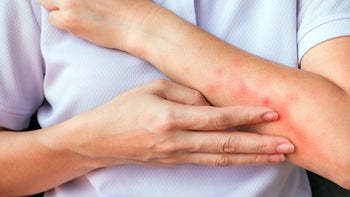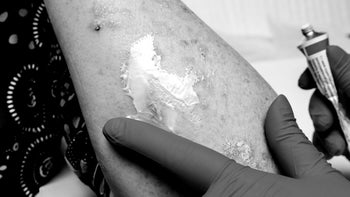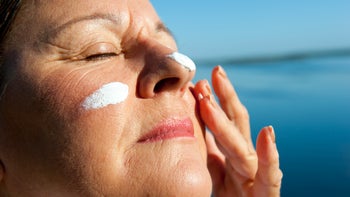
Hard Water vs. Soft Water: What’s the Difference and Which Is Better for You?
Key takeaways:
Water hardness refers to the mineral content in water, with hard water having more minerals and soft water having fewer minerals.
There is no clear consensus on whether hard water or soft water is better for drinking, but soft water is gentler on the skin and hair.
Testing water quality can help determine if it is hard or soft. And water softeners or filters can be used to alter water hardness based on personal preference or specific needs.

Have you ever noticed how the taste of water differs between cities, even within the U.S.? The water hardness of an area sometimes causes this variation in taste. And it can also affect people’s hair and skin.
What’s the difference between hard water vs. soft water?
Water is considered hard when it contains more minerals and soft when it contains fewer. According to the United States Geological Survey (USGS), hard water generally contains more calcium and magnesium than soft water.
Hard water can also contain other metals, such as:
Aluminum
Barium
Zinc
Iron
Search and compare options
These minerals are often present because of natural causes. A water source for example, might flow over rocks that contain calcium and magnesium. These dissolved minerals naturally occur in the environment and in many foods and drinks, so they aren’t inherently harmful.
Water hardness is measured on a scale of milligrams per liter (mg/L) of calcium carbonate equivalent. The scale ranges from 0, considered very soft, to 180 and above, considered very hard.
Which is better for drinking: hard water or soft water?
The debate of hard water versus soft water is still unresolved when it comes to drinking water. One potential benefit of hard water is that it has additional mineral content. In areas where nutrient-dense food is scarce, this could help alleviate some mineral deficiencies.
But there aren’t any definitive scientific studies that prove that hard water or soft water causes or prevents any specific health issues.
Some reports show hard water is correlated with improved heart health, but also with increased risk of kidney stones. However, more research is needed to prove there’s anything stronger than a correlation. As so many environmental factors contribute to a person’s health, it’s challenging to confirm that hard water versus soft water alone poses health risks.
Which is better for your skin: hard water or soft water?
Heather Williams, MD, is a pediatrician and an assistant professor of pediatrics at UNC School of Medicine in Chapel Hill, North Carolina. According to Williams, there is a link between hard water and eczema in infants and children.
Read more like this
Explore these related articles, suggested for readers like you.
“This is thought to be related to hard water increasing deposition of chemicals found in soaps,” Williams told GoodRx Health. “This, in turn, aggravates and inflames the skin.”
Other known effects of hard water on the skin — and hair — include:
Itchy or dry skin
Brittle hair
Disruption of the skin barrier
Since exposing skin to hard water has no known health benefits, it’s best to opt for softer water for bathing and personal care if possible.
What are the disadvantages of hard water and soft water?
Although most people prefer soft water, both hard and soft water have their respective disadvantages. The table below compares the disadvantages of both.
Disadvantages of hard water | Disadvantages of soft water |
Mineral deposits | High sodium content from water softeners |
Soap scum and buildup | Corrosion risk to household plumbing |
Reduced soap and shampoo lather | Altered taste |
Skin dryness and irritation | |
Buildup on the scalp and hair | |
Altered taste |
How can you tell if your water is hard or soft?
To determine if you have hard or soft water in your pipes, you can research your local water source or get it tested.
If your water is from a locally regulated source, you don’t need to test it unless you want to. It’s likely that there’s a water quality report available online, since local governments often make these reports public. And that will help you learn more about whether you have hard or soft water.
You may want to test your water if:
You have an older home where there’s a risk of lead in the piping.
Your skin or hair is irritated.
You don’t like the taste of your water.
Your water supply is from a private well that has not been tested in over a year.
You notice signs of hard water, like mineral buildup on your clothing or dishes.
To find out if you have hard water versus soft water, or to test your water quality, contact your local health department for more information. If you order a testing product, ensure it is from an EPA-certified laboratory, meaning it meets the standards of the Environmental Protection Agency. To learn more, you can visit the EPA website.
How can you make your water softer or harder?
The benefits of soft water often lead people to reach for water softeners. But there are ways to both soften or harden the water in your home, regardless of where it sits on the water hardness scale.
There are a couple ways to make your water softer:
Water softener: A water softener (also called a point-of-entry iron exchange) removes minerals by adding potassium or sodium ions to water. As sodium can increase blood pressure, consider a water softener that uses potassium if you have high blood pressure.
Reverse osmosis (RO): This process removes almost all minerals from water.
Temporary softening options: If you want softer water to shower or wash your hair with, you can purchase a filtering showerhead that removes minerals. To soften drinking water, water filters work well.
There are a few ways to make your water harder:
Install a hardness-adding system. This system adds minerals back into the water. It’s also called a calcite filter or remineralization filter.
Adjust your water softener. If you already have a water softener, you can adjust the settings to make the water less soft.
Alter it when necessary. If you need hard water for a specific task, like filling up a fish tank or washing a load of laundry, you can add minerals.
The bottom line
The hard water versus soft water debate all comes down to your personal preferences. Hard water can be rough on skin and the external surfaces of dishes and laundry. However, there’s little solid evidence that hard water negatively impacts your health. Whether you prefer hard water or soft water, the key is ensuring you get your necessary daily minerals and hydration to stay healthy.
Why trust our experts?



References
Boothby, S. (2022). Get the facts: Hard water. National Eczema Association.
Sengupta, P. (2013). Potential health impacts of hard water. International Journal of Preventive Medicine.
U.S. Environmental Protection Agency. (2023). Cation exchange water softeners.
U.S. Environmental Protection Agency. (2023). Overview of drinking water treatment technologies.
U.S. Geological Survey Water Science School. (2018). Hardness of water.
World Health Organization. (2010). Hardness in drinking-water.





























